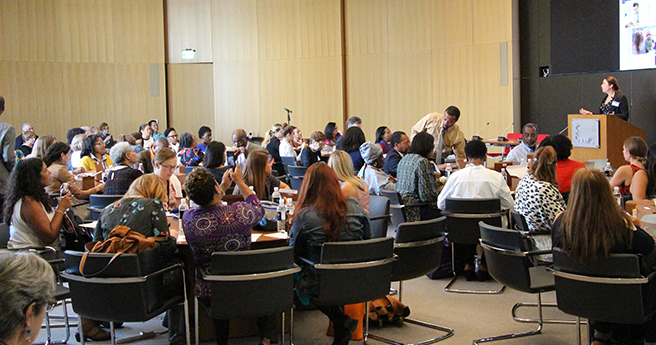
Photo by Matt Schorr
National Center for Advancing Translational Sciences (NCATS) Office of Rare Diseases Research Director Petra Kaufmann, MD, MSc speaks to community advocates and researchers gathered at the Advancing CEnR 2017 Conference.
NASHVILLE, Tenn. All too often, community and research are disconnected. Clinical studies move forward with little to no input from the populations they impact, and local voices are left out of the conversation.
The Advancing the Science of Community Engaged Research (CEnR) Conference – held at the Association of American Medical Colleges (AAMC) in Washington, D.C. – intends to change that.
Meharry Medical College (MMC) and Vanderbilt University Medical Center (VUMC) hosted the conference for the second year in September 2017. It provides a forum for Community Health Workers (CHWs), clergy, advocates and other community stakeholders to meet with medical researchers on a national platform.
Vision for the Conference
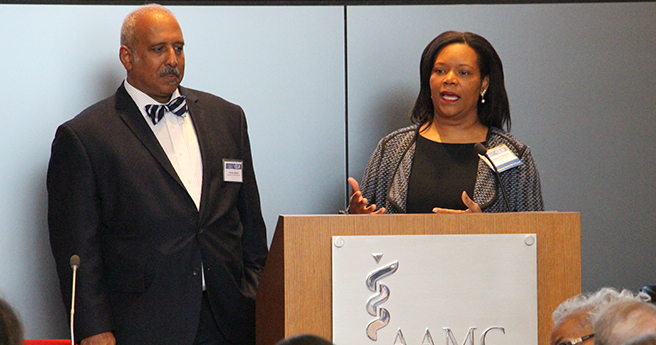
Photo by Matt Schorr
Charles Mouton, MD, Vice Dean for Academic Affairs and Professor of Family Medicine at the University of Texas Medical Branch at Galveston, and Meharry-Vanderbilt Alliance Executive Director Consuelo H. Wilkins, MD, MSCI welcome attendees to the Advancing CEnR 2017 Conference and highlight the importance of engaging communities in research.
“There is still a crucial need to engage communities in research,” Meharry-Vanderbilt Alliance (MVA) Executive Director Consuelo H. Wilkins, MD, MSCI, who chaired the Conference Organizing Committee, said.
“Engaging communities can make research more relevant and speed the process of getting new research into practice. We must continue developing meaningful ways to engage communities, individuals and patients.”
Over 200 attended the 2017 conference, which empowered community stakeholders to interact and work with researchers.
Community Scholars from across the nation
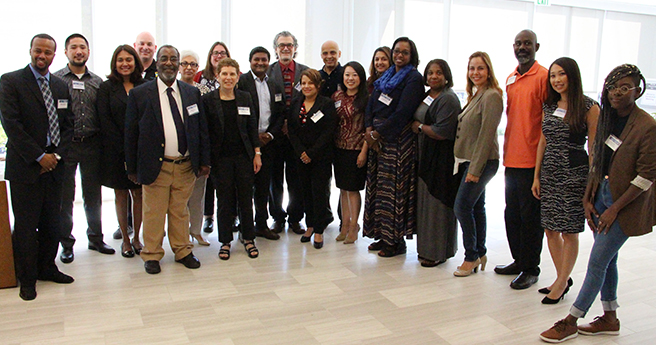
Photo by Matt Schorr
Twenty Community Scholars from across the United States attended the Advancing CEnR 2017 Conference thanks to funding from the National Center for Advancing Translational Sciences (NCATS) and the National Institute on Minority Health and Health Disparities (NIMHD).
Support from the National Center for Advancing Translational Sciences (NCATS) and the National Institute on Minority Health and Health Disparities (NIMHD) made it possible for 20 Community Scholars to attend.
The Scholars, who represented community groups ranging from faith-based associations like Apostolic Faith Church to advocacy organizations like Latina Contra Cancer and Community Faces of Utah, met with national research leaders including NIMHD Director Eliseo. J. Pérez-Stable, MD and NCATS Office of Rare Diseases Research Director Petra Kaufmann, MD, MSc. Pérez-Stable and Kaufmann were featured speakers at the conference, and they discussed the importance of diversity in science and medicine, as well as collaboration with communities across the entire research spectrum.
Voices from the community
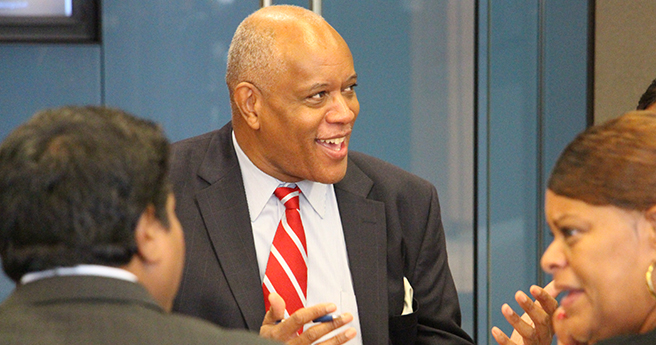
Photo by Matt Schorr
Community Campus Partnerships for Health Executive Director Al Richmond meets with Community Scholars during a Networking Lunch at the Advancing CEnR 2017 Conference.
“This conference has succeeded in refueling my passion for community-based participatory research to find better ways of assisting in the care of disenfranchised and underserved populations,” Geraldine Peacock of Apostolic Faith Church, Chicago, IL, commented.
”It’s been an amazing conference,“ Al Richmond, Executive Director of Community Campus Partnerships for Health in Raleigh, NC, said. “We’ve heard a lot of amazing ideas from both academic and community partners related to community engagement.”
“By attending the CEnR conference in DC, I was able to gain invaluable insight on how the community and the academic research community can work together to advance their work in addressing health disparities in our respective communities,” Jeannette Gonzalez from Gilda’s Club in Chicago, a cancer support community, said.
Learning Labs and Think Tanks
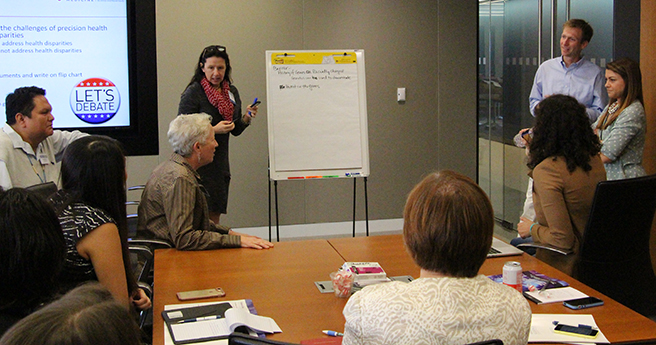
Photo by Matt Schorr
Researchers and community stakeholders discuss community engagement methods and obstacles during a Learning Lab at the Advancing CEnR 2017 Conference.
Kimberlee Hyman, a Community Scholar from North Carolina, noted, “I loved brainstorming in Learning Labs with others on how to disseminate and to go through all the potential barriers.”
Learning Labs and Think Tank Discussions served as “how to” breakout sessions, delivering practical guides about CEnR approaches. Learning Labs brought researchers in contact with community stakeholders to share insight and experiences. Think Tanks, meanwhile, focused on emerging topics, allowing attendees to discuss new perspectives and ideas.
Topics ranged from partnering with CHWs in research, to using CEnR for health equity, to engaging underrepresented groups.
Final thoughts
Jason Resendez, Director of the US Alzheimer’s Latino Network and Latinos Against Alzheimer’s Coalition, described the conference in his Medium.com blog, Social Justice in Scientific Research: Research with them and not to them, “I was grateful to be part of the dialogue made possible by MMC and VUMC.”
“The conference explored how researchers could better partner with communities to examine and address health inequities,” Resendez wrote, then highlighted social media posts from himself and other attendees noting the importance of bringing community members to the research table, especially those who might not normally be there.
“You have a right,” he tweeted. “Patients and communities have rights in research and to research.”
About the Meharry-Vanderbilt Alliance
Founded in 1999, the Alliance bridges the institutions of Meharry Medical College and Vanderbilt University Medical Center. Its mission is to enrich learning and advance clinical research in three primary areas -- community engagement, interprofessional education and research -- by developing and supporting mutually beneficial partnerships between Meharry Medical College, Vanderbilt University Medical Center and the communities they serve. Through community engagement, the Alliance serves a large community of stakeholders including surrounding universities and colleges, community organizations, faith-based outlets and community health centers. Its interprofessional education enhances students' interdisciplinary understanding and improves patient outcomes through integrated care. The research conducted provides access to experienced grant writers and materials supporting the grant application process and facilitates grant-writing workshops.




